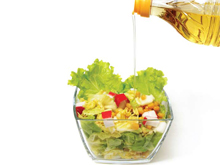 |
Despite the fact that many people think Indian diet is full of fat, recent research has shown that 90% of us do not eat enough good fats. Body fat storage is often associated with excess dietary fat intake, though these factors are loosely correlated, they by no means, form the complete picture as far as unwanted weight gain is concerned — fat intake does not always pose these kinds of problems. Since it has been proven as a medical fact that dietary fat can have a deleterious impact on health and body composition, hence it’s essential to understand the fat quality in detail. We need to know that when it comes to fats, they are not all created equal, they can be broadly categorised into three groups; |
the good fat (Monounsaturated and Polyunsaturated which are beneficial to your health, and heart) and the badfat (Saturated fat) and the very bad fat (Trans fats).
Remember that all fats are high in calories – that in mind, the best choices for heart health are the monounsaturated fats (oils, nuts and peanut butter), omega-3 fats (fatty fish such as salmon and tuna) and the polyunsaturated fats (mayonnaise, pumpkin seeds etc.).
Omega-3 and Omega-6
There are three types of omega-3 fatty acids: docosahexaenoic acid (DHA) and eicosapentaenoic acid (EPA) found in fish oil, and alpha-linolenic acid (ALA) found in plant foods such as nuts, seeds, and vegetable oils (especially flaxseed oil). Omega-3 fatty acids are not one single nutrient, but a collection of EPA, ALA and DHA. They are proved to lower blood pressure, combat LDL (bad) cholesterol, fight inflammation and protect the brain and nervous system.
Omega-6 fats stimulate the inflammatory pathways and promote blood clotting. Omega-3 fatty acids on the other hand are anti-inflammatory in nature and thin the blood.
Carry home message
Really good fats/oils come from unrefined vegetable sources or oily fish. Here are some basic guidelines for how to choose the best type of fat:
- For cooking, use extra virgin olive oil or alternate between the blend of MUFA with PUFA.
- For salads, use canola oil, soy oil, extra virgin olive oil.
- Eat regular helpings of oily fish like salmon, mackerel, sardines and tuna. Add pumpkin seeds, walnuts, and flax seed or meal to your diet frequently; eat more greens and squash, use olive oil and some cold-pressed canola or walnut oil when cooking, and try to eat grass fed meats whenever possible.
Note: Flax seed oil, hemp seed oil, canola oil and oily fish are great sources of one of the key essential fatty acids. |
Dr.Priyanka Rohatgi is Chief Clinical Nutritionist and Head,Department of Clinical Nutrition and Dietetics, Apollo Hospitals, Bangalore.
|
|